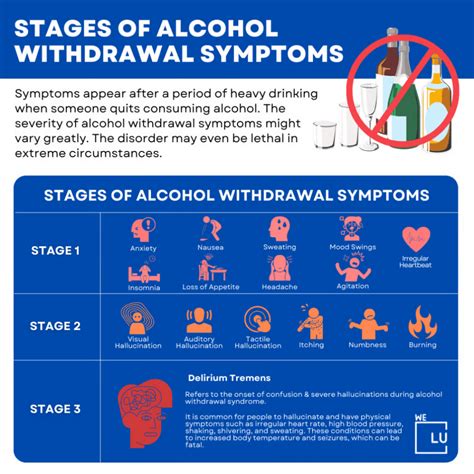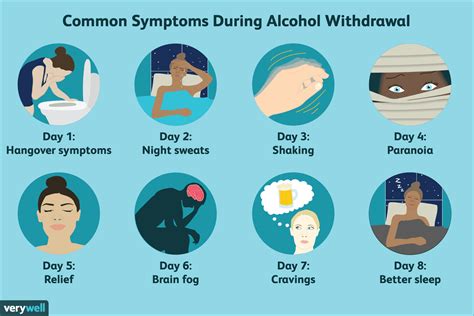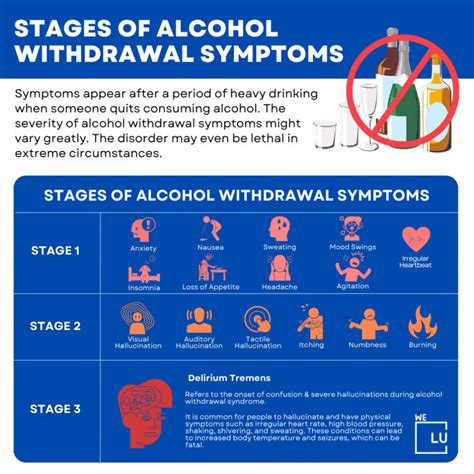Intro
Understand alcohol withdrawal symptoms, including tremors, seizures, and delirium tremens. Learn about the timeline, treatment, and management of withdrawal syndrome, and discover ways to cope with alcohol dependence and addiction recovery.
Alcohol withdrawal symptoms can be a challenging and intimidating experience for individuals who have been struggling with alcohol addiction. The process of quitting alcohol can be difficult, and the symptoms that come with it can be overwhelming. However, understanding the symptoms and the process of alcohol withdrawal can help individuals better prepare themselves for the journey to recovery. In this article, we will delve into the world of alcohol withdrawal symptoms, exploring the causes, effects, and treatment options available.
The importance of understanding alcohol withdrawal symptoms cannot be overstated. Alcohol addiction is a serious issue that affects millions of people worldwide, and the journey to recovery can be long and arduous. By educating ourselves on the symptoms and effects of alcohol withdrawal, we can better support those who are struggling with addiction and provide them with the necessary tools and resources to overcome their struggles. Furthermore, understanding the symptoms of alcohol withdrawal can also help individuals identify the signs of addiction in themselves or others, allowing for early intervention and treatment.
Alcohol withdrawal symptoms can range from mild to severe, and can be both physical and psychological in nature. The symptoms can vary depending on the individual's level of addiction, the amount of alcohol consumed, and the duration of use. Some common symptoms of alcohol withdrawal include tremors, seizures, hallucinations, and delirium tremens. These symptoms can be uncomfortable and even life-threatening, making it essential to seek medical attention if they occur. In the following sections, we will explore the causes, effects, and treatment options for alcohol withdrawal symptoms in more detail.
What are Alcohol Withdrawal Symptoms?

Causes of Alcohol Withdrawal Symptoms
The causes of alcohol withdrawal symptoms are complex and multifaceted. When an individual drinks alcohol regularly, their brain chemistry changes to adapt to the presence of the substance. The brain produces neurotransmitters such as gamma-aminobutyric acid (GABA) and glutamate, which help to regulate mood, sleep, and other functions. However, when alcohol is present, the brain produces more GABA and less glutamate, leading to a state of relaxation and reduced anxiety. When the individual stops drinking, the brain is suddenly deprived of the substance, leading to an imbalance in neurotransmitters and a range of withdrawal symptoms.Types of Alcohol Withdrawal Symptoms

These symptoms can be uncomfortable and even life-threatening, making it essential to seek medical attention if they occur. In severe cases, alcohol withdrawal symptoms can lead to delirium tremens, a condition characterized by confusion, agitation, and hallucinations.
Treatment Options for Alcohol Withdrawal Symptoms
Treatment for alcohol withdrawal symptoms typically involves a combination of medical and therapeutic interventions. Medications such as benzodiazepines and barbiturates can help to reduce the severity of symptoms, while therapies such as cognitive-behavioral therapy (CBT) and counseling can help individuals address underlying issues and develop coping strategies.In severe cases, hospitalization may be necessary to ensure the individual's safety and provide close monitoring and treatment. Additionally, support groups such as Alcoholics Anonymous (AA) can provide a sense of community and connection, helping individuals stay motivated and committed to their recovery.
Managing Alcohol Withdrawal Symptoms

By using these strategies, individuals can better manage their symptoms and reduce the risk of complications. Additionally, seeking medical attention if symptoms occur can help ensure a safe and successful recovery.
Preventing Alcohol Withdrawal Symptoms
Preventing alcohol withdrawal symptoms requires a long-term commitment to reducing or eliminating alcohol consumption. Some strategies for preventing symptoms include: * Gradually reducing alcohol consumption over time to minimize the risk of withdrawal * Seeking support from friends, family, or support groups to stay motivated and connected * Engaging in regular exercise and healthy habits to reduce stress and anxiety * Practicing relaxation techniques, such as deep breathing or meditation, to reduce symptoms * Seeking medical attention if symptoms occur to ensure a safe and successful recoveryBy using these strategies, individuals can reduce their risk of developing alcohol withdrawal symptoms and improve their overall health and well-being.
Conclusion and Next Steps

We invite you to share your thoughts and experiences with alcohol withdrawal symptoms in the comments below. Have you or a loved one struggled with addiction? What strategies have you found most helpful in managing symptoms and achieving recovery? By sharing your story, you can help others feel less alone and more motivated to seek help.
What are the most common symptoms of alcohol withdrawal?
+The most common symptoms of alcohol withdrawal include tremors, seizures, hallucinations, and delirium tremens. These symptoms can range from mild to severe and can be both physical and psychological in nature.
How long do alcohol withdrawal symptoms last?
+Alcohol withdrawal symptoms can last anywhere from a few days to several weeks, depending on the individual's level of addiction and overall health. In severe cases, symptoms can persist for several months or even years.
Can alcohol withdrawal symptoms be life-threatening?
+Yes, alcohol withdrawal symptoms can be life-threatening. Delirium tremens, a condition characterized by confusion, agitation, and hallucinations, can be fatal if left untreated. It is essential to seek medical attention if symptoms occur.
